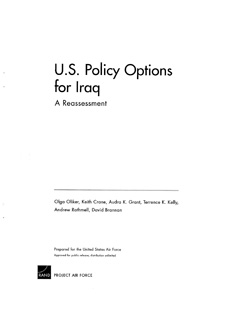|
PREFACE
In light of the continuing violence in Iraq, U.S. policymakers continue to reexamine policy options and their repercussions. This monograph assesses a number of approaches that the U.S. government can consider in its efforts to reduce sectarian violence and stabilize Iraq and presents recommendations that may help increase the likelihood of success. It also considers possible next steps to take, whether these efforts succeed or fail.
The monograph should be of interest to policy make ¡s and analysts involved in international security and U.S. foreign policy particularly U.S. policy toward Iraq. The analysis in this monograph is based on more than e. year of research, which included travel to the region and extensive interviews with U.S., Iraqi, and other specialists, analysts, and officials, as one component of the project "The U.S. Air Force Role in the Middle East." It involved a multidisciplinary team of researchers who brought their expertise in political, economic, and military strategic analysis to these important questions. Readers of this monograph may also find the following Rand publications to be of interest:
- America's Role in Nation-Building: From Germany to lraq, by James Dobbins, John G. McGinn, Keith Crane, Seth G. Jones, Rollie Lal, Andrew Rachel, Rachel M. Swanger and Anga Timilsina (MR-1753-RC, 2003)
Developing lraq's Security Sector: The Coalition Provisional Authority's Experience, by Andrew Rathmell, Olga Oliker, Terrence K. Kell¡ David Brannan, and Keith Crane (MG-365-OSD, 2005)
- The UN's Role in Nation-Building From the Congo to lrøq, by James Dobbins, Seth G. Jones, Keith Crane, Andrew Rathmell, Brett Steele, Richard Teltschik, and Anga Timilsina (MG-304-RC, 2005)
Insargenqt and Counterinsargenc! in lraq, by Bruce Hoffman (OPI27-TPC|CMEPP, 2oo4).
The research was sponsored by the Directorate for Operational Plans and Joint Matters, headquarters, U.S. Air Force (formerly AF / XOX, now A5X) and conducted within the Strategy and Doctrine Program of Rand Project Air Force. The research for this report was completed in February 2007.
Rand Project Air Force
Rand Project Air Force (Paf), a division of the Rand Corporation, is the U.S. Air Force's federally funded research and development center for studies and analyses. Paf provides the Air Force with independent analyses of policy alternatives affecting the development, employment, combat readiness, and support of current and future aerospace forces.
Research is conducted in four programs: Aerospace Force Development; Manpower Personnel, and Training; Resource Management; and Strategy and Doctrine.
Additional information about Paf is available on our Web site:
http://www.rand.org/paf/
Summary
Iraq is the most pressing foreign and security policy issue that the United States faces today. Continued failure to make Iraq stable and secure threatens to disrupt the Middle East not by catalyzing the spread of democracy but by exporting instability and conflict. If violence continues, Iraqi neighbours will use the country as a theatre in which to pursue their own goals, including those at odds with Iraqi and U.S. interests. Iraq will remain a training ground for terrorist groups, threatening U.S. and allied security. Continued conflict in Iraq not only will remain extraordinarily costly in terms of U.S. lives and resources, but will also damage the credibility of the United States and the efficacy of U.S. forces. It also feeds perceptions around the world that the United States is engaged in a "war on Islam."
The U.S. government needs to consider alternative strategies and approaches for reducing the violence in Iraq. Even if policymakers choose not to make major changes, adjustments to current policies help improve the effectiveness of the U.S. effort though they can by no means guarantee success. The U.S. government should also begin considering next steps in Iraq in the eyent rhat the United States attains its policy goals and in the event that it does not.
Strategies
No effort to foster democracy and economic development in Iraq can succeed until the Iraqi people become more secure. Rising secrarian has supplanted insurgent and criminal violence as the great ... |
